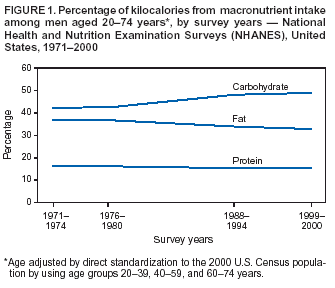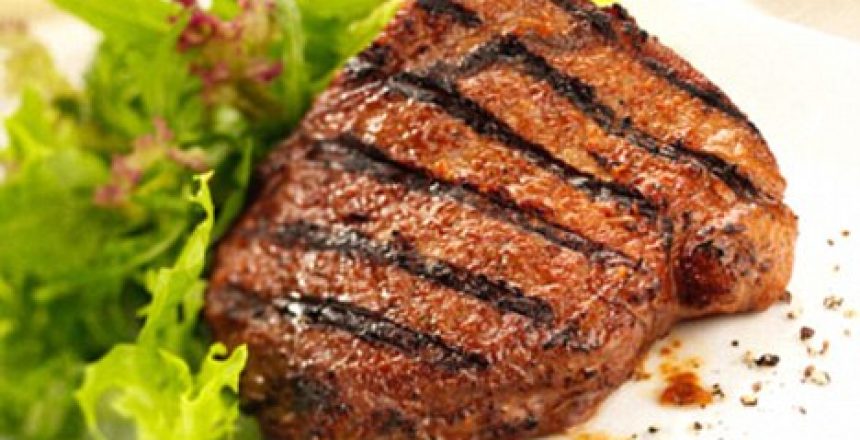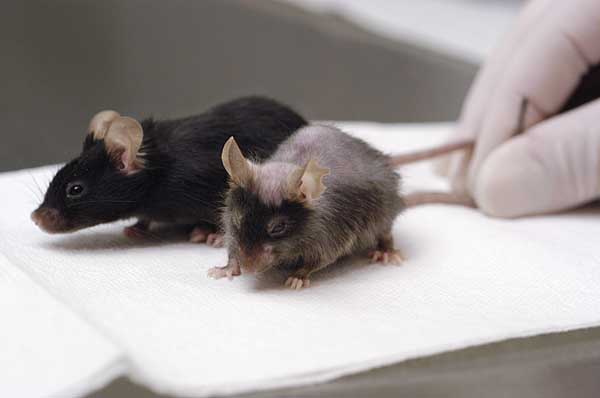By now we know that low-carbohydrate diets are much more effective for weight loss than standard low-calorie or low-fat diets. Usually, the effectiveness of low-carbohydrate diets is attributed to their low carbohydrate content, which leads to lower insulin, better appetite control, and spontaneous calorie reduction. But there’s something else a typical low-carb diet has that may make a big difference in weight loss: more protein.
Protein leverage and the obesity epidemic
The obesity epidemic in this country began in earnest in the mid-1970s, and it shows no sign of stopping. Researchers have postulated many reasons for the obesity epidemic, including greater consumption of calories, carbohydrates, and fat; less physical activity; even chemical toxins. Many proponents of low-carbohydrate diets have fixed upon the introduction of national dietary guidelines in the U.S., which recommended cutting saturated fat and led to increased consumption of carbohydrates, which were thought to be benign or even healthy. The following chart, from the CDC, shows how nutrient consumption changed. (Note the chart only goes up to the year 2000.)

Most observers have focused on increased carbohydrate consumption, which went from 42 to 49% of calories. Fat consumption decreased from 37 to 33%. (These figures are for men; the figures for women are similar.) Calorie consumption also increased, from 2,450 to 2,618 calories a day.
The least attention has been paid to protein: its consumption declined from 16.5% to 15.5% in men, and from 16.9% to 15.1% in women.
Since 1) the intake of protein is lower than from fat and carbohydrates, and 2) the intake of protein hasn’t changed much throughout the obesity epidemic, it’s been thought that protein is relatively unimportant. But those two facts are precisely what gives protein the leverage to drive the obesity epidemic. These ideas make up the protein leverage hypothesis of obesity. (Full paper for download at Google Scholar.)
Leverage refers to the ability of small differences in forces to cause outsize effects in outcomes. If protein has leverage, then small changes in intake could drive obesity.
Consider some evidence for protein leverage:
- Animals and humans given a choice of food with widely varying protein content will consume enough (or as little) as needed to meet a protein target. For humans, this seems to hover around 15% of calories. We prioritize protein.
- When food protein content is low, more fat and carbohydrate are necessarily ingested, leading to weight (fat) gain.
- Protein alleviates hunger more effectively than carbohydrate or fat.
If protein requirements increase, and if food is relatively dilute in protein, then more food – and more fat, carbohydrate, and calories – must be ingested to increase protein intake.
There are several circumstances when protein requirements as a percentage of calories increase. One is less physical activity. Yes, less.
Protein is used by the body mainly for the building and maintenance of structure, while fat and carbohydrates are used for energy. The maintenance requirement for protein doesn’t change much; a more or less constant amount is needed. But if physical activity declines, then less carbohydrate and fat are needed, and therefore the percentage of dietary protein must increase to maintain a constant amount.
Another use of protein is in gluconeogenesis, the making of glucose when carbohydrate isn’t available. Gluconeogenesis normally proceeds at a low basal rate, and insulin strongly suppresses this process. In insulin resistance, such as in the metabolic syndrome and type 2 diabetes, gluconeogenesis proceeds unabated, using dietary protein and/or breaking down muscle to fuel it. So in insulin resistant states, protein requirements increase.
Perhaps the most important point of protein as it relates to the obesity epidemic is that, if only low-protein food is available, one must increase food consumption to obtain adequate protein.
Has the protein content of food declined since before the obesity epidemic until now? Yes.
We’ve been advised to eat less meat, dairy, and eggs due to their saturated fat content. These are all high-protein foods. The following charts show changes in macronutrient consumption plotted against obesity rates. The protein-obesity correlation (a negative one) is the strongest. Countries that have increased protein intake have the lowest rate of obesity.

Many predictions of the protein leverage hypothesis of obesity have been borne out in experiments.
In mice, diets low in protein led to higher food intake and fat gain.
In humans, data collected from 38 different trials of food consumption that used widely varying intakes of protein, from 8 to 54% of energy, showed:
Percent dietary protein was negatively associated with total energy intake (F = 6.9, P < 0.0001) irrespective of whether carbohydrate (F = 0, P = 0.7) or fat (F = 0, P = 0.5) were the diluents of protein. The analysis strongly supports a role for protein leverage in lean, overweight and obese humans.
In a human trial, decreasing the percentage of protein in food from 15% to 10% led to increased calorie intake of 12%. However, increasing the protein percentage from 15 to 25% did not affect calorie intake, which shows that humans may target a certain amount of protein, and eat no more or less when they get it.
Implications for the obesity epidemic
Protein content of food has declined in many countries since before the obesity epidemic, and protein consumption is negatively correlated to obesity rates.
It turns out that eating breakfast cereal, bagels, and pasta may have a serious downside that no one considered before they placed us all on an unregulated, non-consensual national experiment.
Implications for weight loss
The lesson here is obvious: if you want to lose weight (fat), then eat more foods that are higher in protein, and less of those that are lower.
High protein foods include meat, eggs, fish, and dairy products (not including butter and cream).
Ditch the pasta and breakfast cereal and donuts.
Higher protein foods during weight loss have an additional and very important benefit, they help preserve muscle. An unfortunate by-product of fat loss is muscle loss, which ranges from a quarter to a half of all lost weight, and is greatly to be avoided. Higher protein, along with resistance training, can completely abolish this effect, so that all lost weight is fat weight.
Update: Someone expressed a concern about possible harmfulness of high-protein diets, which is a common idea that floats around. In young, healthy, resistance-trained men, one-year of a high protein diet at 4 times the RDA of protein resulted in no effects on kidney and liver function or on blood lipids. Also of interest, the men who ate high protein gained no body weight, despite eating a significantly higher number of calories.
PS: For the other, no less important half of weight loss, see my book, Muscle Up.















7 Comments
I’ve been reading low carb and ketogenic articles for about 10yrs so it’s rare now that I ever think, ‘wow’ when I come across a new nugget of information, but that’s what I did reading this. I had no idea that protein requirements increase in the case of IR, low activity, etc. Also glad you mentioned that satiety is reached more quickly with extra or sufficient protein because too often I’ve read that I must increase my fat intake to satiety, not protein. Thanks for a great article!
Hi TeeDee, thanks. Yes, the protein connection is really overlooked, and the idea that protein requirements increase in insulin resistance and low activity is counter-intuitive.
According to your research, how does an increase in protein effect cholesterol levels?
No. If you see the update I added to the article, a study found that high protein for 1 year had no effect on liver and kidney function, or lipid levels.
For those who get really picky about this, I believe that another factor here is that the energy value of protein consumed is less than what the body can actually use since the energy used will be what is left over after grow-and-repair, and then that amount left over has to be converted by the liver into the body’s version of sugar in order for it to be used as energy. I don’t remember the amount lost in the conversion but it is a meaningful amount (at least 20% I think) so the concept is like shaft horsepower vs. wheel horsepower for the motor-heads in the audience. This is also very handy to know if you should ever find yourself in a CICO foodfight.
Also, while wildly over-consuming protein may seem like a tempting fat-loss strategy and it does work for some people, training the body to over-prefer protein can lead to the skinny-fat phenomenon where the body will actually break down muscle for energy before fat…really bad. This seems to be an epidemic among women.
I Drifter is referring to TEF, Thermal Effect of Food, although I think his mechanism is not accurate. Protein consumes +/- 23% of it’s own calories to digest itself. Free calories!
I go 180 degrees opposite on protein being the cause of “skinny fat.” Those women – it is usually them, spend some time at the beach – are the high carb, low fat crowd. Their weight is appropriate and usually look nice in clothing, but then it literally all hangs out when in a swim suit.
As noted in the main story, a lot of diet weight loss is muscle loss. After my first major loss of about 70 pounds I was amazed to discover I could no longer do one chin up! And recently, the news is out that seniors (you, me!) need more protein than thought. Not sure why.
When I pay attention to my food intake, I aim for about 1 gram of protein per my estimated Lean Body Weight, about 170 pounds. I’ve started doing a cup of whey isolate daily, 63 grams of quality protein.
That should have been, “I THINK Drifter………….”